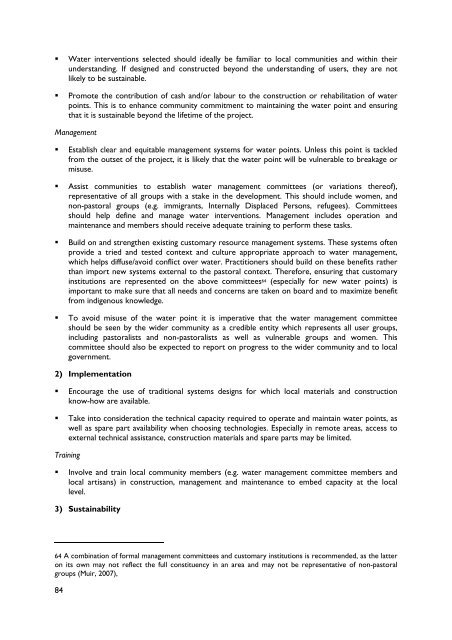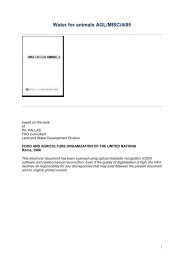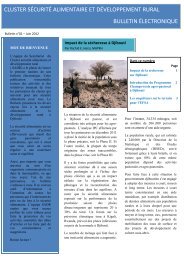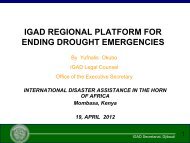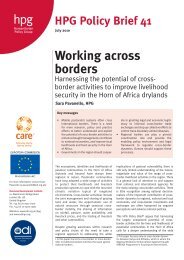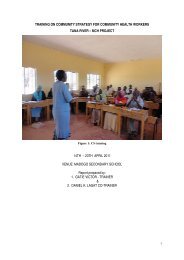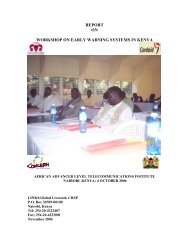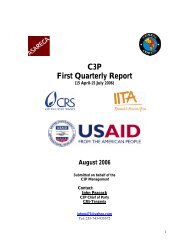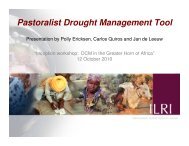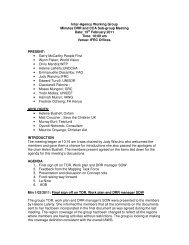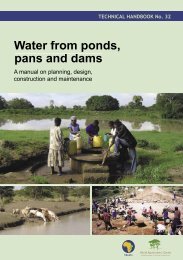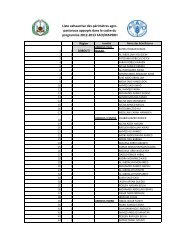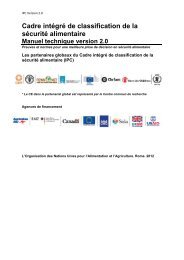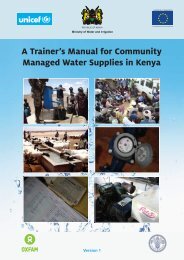Synthesis of Existing Knowledge and Experience on the Provision of ...
Synthesis of Existing Knowledge and Experience on the Provision of ...
Synthesis of Existing Knowledge and Experience on the Provision of ...
You also want an ePaper? Increase the reach of your titles
YUMPU automatically turns print PDFs into web optimized ePapers that Google loves.
• Water interventi<strong>on</strong>s selected should ideally be familiar to local communities <str<strong>on</strong>g>and</str<strong>on</strong>g> within <strong>the</strong>irunderst<str<strong>on</strong>g>and</str<strong>on</strong>g>ing. If designed <str<strong>on</strong>g>and</str<strong>on</strong>g> c<strong>on</strong>structed bey<strong>on</strong>d <strong>the</strong> underst<str<strong>on</strong>g>and</str<strong>on</strong>g>ing <str<strong>on</strong>g>of</str<strong>on</strong>g> users, <strong>the</strong>y are notlikely to be sustainable.• Promote <strong>the</strong> c<strong>on</strong>tributi<strong>on</strong> <str<strong>on</strong>g>of</str<strong>on</strong>g> cash <str<strong>on</strong>g>and</str<strong>on</strong>g>/or labour to <strong>the</strong> c<strong>on</strong>structi<strong>on</strong> or rehabilitati<strong>on</strong> <str<strong>on</strong>g>of</str<strong>on</strong>g> waterpoints. This is to enhance community commitment to maintaining <strong>the</strong> water point <str<strong>on</strong>g>and</str<strong>on</strong>g> ensuringthat it is sustainable bey<strong>on</strong>d <strong>the</strong> lifetime <str<strong>on</strong>g>of</str<strong>on</strong>g> <strong>the</strong> project.Management• Establish clear <str<strong>on</strong>g>and</str<strong>on</strong>g> equitable management systems for water points. Unless this point is tackledfrom <strong>the</strong> outset <str<strong>on</strong>g>of</str<strong>on</strong>g> <strong>the</strong> project, it is likely that <strong>the</strong> water point will be vulnerable to breakage ormisuse.• Assist communities to establish water management committees (or variati<strong>on</strong>s <strong>the</strong>re<str<strong>on</strong>g>of</str<strong>on</strong>g>),representative <str<strong>on</strong>g>of</str<strong>on</strong>g> all groups with a stake in <strong>the</strong> development. This should include women, <str<strong>on</strong>g>and</str<strong>on</strong>g>n<strong>on</strong>-pastoral groups (e.g. immigrants, Internally Displaced Pers<strong>on</strong>s, refugees). Committeesshould help define <str<strong>on</strong>g>and</str<strong>on</strong>g> manage water interventi<strong>on</strong>s. Management includes operati<strong>on</strong> <str<strong>on</strong>g>and</str<strong>on</strong>g>maintenance <str<strong>on</strong>g>and</str<strong>on</strong>g> members should receive adequate training to perform <strong>the</strong>se tasks.• Build <strong>on</strong> <str<strong>on</strong>g>and</str<strong>on</strong>g> streng<strong>the</strong>n existing customary resource management systems. These systems <str<strong>on</strong>g>of</str<strong>on</strong>g>tenprovide a tried <str<strong>on</strong>g>and</str<strong>on</strong>g> tested c<strong>on</strong>text <str<strong>on</strong>g>and</str<strong>on</strong>g> culture appropriate approach to water management,which helps diffuse/avoid c<strong>on</strong>flict over water. Practiti<strong>on</strong>ers should build <strong>on</strong> <strong>the</strong>se benefits ra<strong>the</strong>rthan import new systems external to <strong>the</strong> pastoral c<strong>on</strong>text. Therefore, ensuring that customaryinstituti<strong>on</strong>s are represented <strong>on</strong> <strong>the</strong> above committees 64 (especially for new water points) isimportant to make sure that all needs <str<strong>on</strong>g>and</str<strong>on</strong>g> c<strong>on</strong>cerns are taken <strong>on</strong> board <str<strong>on</strong>g>and</str<strong>on</strong>g> to maximize benefitfrom indigenous knowledge.• To avoid misuse <str<strong>on</strong>g>of</str<strong>on</strong>g> <strong>the</strong> water point it is imperative that <strong>the</strong> water management committeeshould be seen by <strong>the</strong> wider community as a credible entity which represents all user groups,including pastoralists <str<strong>on</strong>g>and</str<strong>on</strong>g> n<strong>on</strong>-pastoralists as well as vulnerable groups <str<strong>on</strong>g>and</str<strong>on</strong>g> women. Thiscommittee should also be expected to report <strong>on</strong> progress to <strong>the</strong> wider community <str<strong>on</strong>g>and</str<strong>on</strong>g> to localgovernment.2) Implementati<strong>on</strong>• Encourage <strong>the</strong> use <str<strong>on</strong>g>of</str<strong>on</strong>g> traditi<strong>on</strong>al systems designs for which local materials <str<strong>on</strong>g>and</str<strong>on</strong>g> c<strong>on</strong>structi<strong>on</strong>know-how are available.• Take into c<strong>on</strong>siderati<strong>on</strong> <strong>the</strong> technical capacity required to operate <str<strong>on</strong>g>and</str<strong>on</strong>g> maintain water points, aswell as spare part availability when choosing technologies. Especially in remote areas, access toexternal technical assistance, c<strong>on</strong>structi<strong>on</strong> materials <str<strong>on</strong>g>and</str<strong>on</strong>g> spare parts may be limited.Training• Involve <str<strong>on</strong>g>and</str<strong>on</strong>g> train local community members (e.g. water management committee members <str<strong>on</strong>g>and</str<strong>on</strong>g>local artisans) in c<strong>on</strong>structi<strong>on</strong>, management <str<strong>on</strong>g>and</str<strong>on</strong>g> maintenance to embed capacity at <strong>the</strong> locallevel.3) Sustainability64 A combinati<strong>on</strong> <str<strong>on</strong>g>of</str<strong>on</strong>g> formal management committees <str<strong>on</strong>g>and</str<strong>on</strong>g> customary instituti<strong>on</strong>s is recommended, as <strong>the</strong> latter<strong>on</strong> its own may not reflect <strong>the</strong> full c<strong>on</strong>stituency in an area <str<strong>on</strong>g>and</str<strong>on</strong>g> may not be representative <str<strong>on</strong>g>of</str<strong>on</strong>g> n<strong>on</strong>-pastoralgroups (Muir, 2007),84


